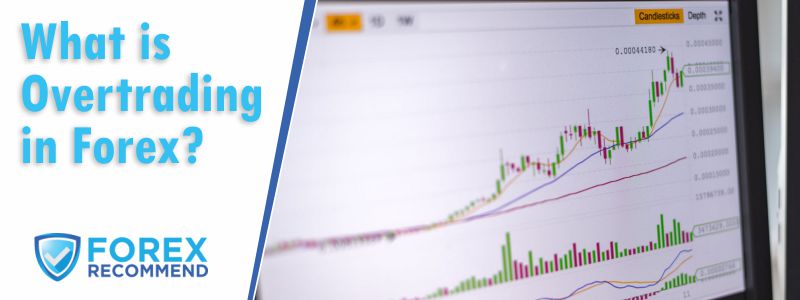
Overtrading is defined by the Securities and Exchange Commission (SEC) as the practice of excessively buying and selling Forex pairs, stocks, or other securities. It comprises trading nonstop all day and, eventually, making unproductive decisions that lead to financial devastation.
Top 10 Forex Brokers
Broker
Rating
Regulators
Min Deposit
Leverage
Website
Top 10 Forex Brokers
Broker
Rating
Min Deposit
Leverage
Overtrading, also known as churning, is considered a psychological issue where traders' emotions are involved, directing their trading decisions instead of using a systematic and tested trading plan.
Churning is a securities law-prohibited technique. Investors can determine whether their broker is overtrading when the frequency of their transactions becomes counterproductive to their financial objectives, resulting in persistently increased commission expenses over time with no discernible outcomes.
It is a problem that both new and seasoned traders may face. It happens when people do not quit trading and finally end up in financial trouble.
Overtrading occurs when a trader or trading broker disregards the restrictions of their approach. They are tempted to raise their trading frequency without first examining their trading plan, which might result in bad performance.
To avoid overtrading, you may change your trading strategy at any moment to make it more limited — for example, by adding rigorous entry and exit conditions.
To avoid overtrading, traders must have a solid trading plan in place that outlines:
- Their reason for trading
- What they aim to achieve with trading
- The amount of time and money that is being committed to trading
- Risk management
- Market knowledge
- Risk-reward ratio
What are the signs that you are Overtrading in Forex?
The only difference between most traders is how much they overtrade. Traders are overtrading unless they are waiting for ideal opportunities and then executing them as if their previous 10 transactions never existed. If the trader's past ten transactions or account balance have any influence on how they pick and execute the following ten deals, they are overtrading.
Overtrading occurs when they trade impulsively, open positions that do not match their strategy or regularly violate their trading guidelines. If they are always altering their trading strategy or hunting for new ones, they are overtrading as well.
Another indicator of overtrading is that individual traders are urgently hunting for trades at the end of the day because they believe they need to make up for losses. In fact, the trader is overtrading if they are not patiently waiting for deals to come to them.
Signs of overtrading include:
- Low-quality trades
- Decreasing win rate
- Over-analysing
- Entering too early
- Doubt
- Burnout
All these factors mentioned form part of an extremely toxic cycle where traders will enter low-quality trades, causing them to experience decreased win rates. Traders will then over-analyse their trades, causing them to enter or exit their trades too early or too late.
This all causes emotional, physical, and mental stress and traders tend to doubt themselves and their trading plan, which can cause a burn-out and serious health and mental distress.
In addition, the following factors are also involved with overtrading.
1. Poor quality of trades that lowers trading standards and profit: When traders are too eager to trade because they have a fear of missing out (FOMO), they can settle for the poor quality of trades, and this can lower their overall trading standards, which will mean lower profit margins.
Traders must ensure that they set their sights on high-quality trades as part of a tested trading strategy that they follow.
2. Trading security in which you do not have any experience: Craving movement, traders frequently adopt a “shotgun blast” strategy, purchasing everything and everything they believe could be good.
Multiple tiny positions open concurrently, none of which the trader has a defined plan for, is a tell-tale symptom of shotgun overtrading.
3. Trading on a shorter timeframe: Traders may overtrade out of fear and believe that trading shorter timeframes can give them increased small profits. However, it can also build up to significant losses.
Traders must consider the right timeframes according to their security and trading strategy and keep to it.
4. Trading within a tight range that affects profits: Stop-loss and take-profit limits are some of the best risk management tools that can be used. However, when traders are scared, and they place these orders too close together or too close to the entry/exit points, their profits can be affected negatively.
How to avoid overtrading in Forex Trading?
- Focus on the process involved with trading
- Develop a solid trading plan
- Refrain from trading all day
- Limit your trades per day
- Take time off after a major loss
- Set stop loss and take profit limits on your trades
- Maintain the right mindset
1. Focus on the process involved with trading: The more systematic and methodological your decision-making, the less opportunity for emotion to enter those judgments. Even if your trading system is ad hoc, you may divide the process into phases.
The more steps you can place between an idea and pressing the buy or sell button, the less likely it is that you will make a marginal deal.
2. Develop a solid trading plan: A well-developed trading strategy should identify a certain instrument that a person wishes to trade, a specified time of day when they intend to execute transactions, and an approximate number of gains and losses that they are willing to accept.
In summary, a trading plan should include a strategy for the day and keep a trader informed of their realistic expectations.
Following these self-made guidelines is one of several overtrading remedies; it can assist traders to recognize that it is best to know when to trade rather than buying and selling shares haphazardly.
3. Refrain from trading all day: Forex trading is not a typical 8-hour profession in which you must constantly initiate new deals and close old ones. What counts most in trading is capturing the proper opportunity, which is not something that can be accomplished by trading all day.
Furthermore, sitting in front of a screen for 8+ hours a day might fatigue a person and impede their capacity to make well-considered judgments.
And, in many traders' views, this is one of the most telling signs of overtrading: believing that you need to trade all day to be successful when all you do is trade excessively and ineffectively.
4. Limit your trades per day: Following a successful trade and a sizable payoff, a trader may be enticed to continue trading and earn even higher payments. Losses have a similar effect: a losing transaction can easily result in the urge to open further positions to offset previous losses.
This is only one of several instances of overtrading: allowing greed and wrath to overcome the trader rather than always keeping rational and level-headed. Establish a daily limit for the number of transactions you wish to initiate.
5. Take time off after a major loss: Overtrading can be triggered by investors feeling compelled to make a deal. As a result, less-than-optimal deals are frequently executed, resulting in a loss.
Taking a break from trading helps investors to examine their trading tactics and ensure they are in line with their overall investing goals.
6. Set stop loss and take profit limits on your trades: Regardless of the techniques or time frames utilized, traders who adhere to stringent position size management outperform those who do not.
Risk management on an individual transaction will help spread the possibility of a significant drop, lowering the psychological difficulties associated with such events.
Stop-loss and take-profit limits are one of the best ways to ensure a profit margin without risking too much capital on a single trade.
When determining the take profit limit, it is a good idea to review your prior transactions and select the deal with the biggest reward.
It is important to remember that if you trade too much, you are going to lose some of your money because of bad trading decisions, even if it is a good thing.
That is why the take profit and stop loss limits are there. As for losses, if they happen repeatedly, you might want to limit the number of bad trades and the amount of money you lose in each one. Stop-loss can help with that.
7. Maintain the right mindset: People who are good at trading have a certain mindset. They are very patient, and they do not worry about the outcome of any single trade.
Ask yourself if that is the way you feel now. If it is not, try to picture yourself in that mindset and act like that. If you keep picturing yourself as a successful trader, your real mindset should change to that of one, too.
Who monitors Overtrading in Forex?
It is the responsibility of every individual trader to monitor their trading in forex.
Traders must take it upon themselves to develop effective ways and strategies to ensure that they do not succumb to overtrading.
Is overtrading a psychological problem?
Yes, overtrading is a psychological problem.
Individual traders, whether self-employed or employed by a financial business on a trading desk, will have limits on the amount of risk they may accept (including how many trades are appropriate for them to make).
To continue trading after they have reached this limit is to act unwisely. While such activity may be detrimental to the trader or the company, it is unregulated by external organizations.
Mismatches between one's profit expectations and the volatility of the market are the root of overtrading, which is when people trade too much.
To put it another way, traders often feel like they need to catch a lot of market moves to reach their goals. When you think about trading, it is good to set goals for yourself.
There is one big problem with this, though. Traders must understand that the market does not move based on what they think it will do. You might overestimate your trading skills to reach your goals and convince yourself that you had a good trading day.
Even though this may work in some cases, it can be bad for your trading psychology if it makes you feel like you are invincible and overconfident that you can trade in any kind of market.
Everyone in the world has been taught to think that they need to work harder and do more to get better results.
There are two frames of mind to consider, an egocentric framing error and an acentric framing error. People who fall in with the egocentric framing error will tend to overtrade because they believe that the more frequently they trade, the higher the chance of correcting losing streaks.
The eccentric frame prevents overtrading because it reminds the individual trader that the information they have may only be a subset of relevant information.
Overtrading can cause addiction to trade, which means that traders who make money or even get excited about making money make their brains produce “feel good” neurochemicals like dopamine and serotonin, which make them feel good.
In this way, they can become addicted, just like gambling or taking illegal drugs.
How does a Forex Broker affect the financial well-being of forex traders?
Forex brokers facilitate the connection that forex traders have to global financial markets. They serve as the bridge across which traders can trade several different types of securities.
Brokers have previously been found guilty of churning trades. This practice has been observed when brokers are compelled to position freshly issued securities underwritten by a firm's investment banking department.
The Securities and Exchange Commission (SEC) provides a simple definition of overtrading, also known as churning. It refers to the excessive buying and/or selling of securities on an individual trader’s account frequently during the same day or over consecutive days without a break.
Brokers who engage in excessive trading may violate SEC Rule 15c1-7, which prohibits manipulative and deceptive behaviour.
In addition, brokers can affect the financial well-being of traders through the following components:
- Minimum deposit requirements
- Spreads, commissions, overnight fees, and other fees charged
- By providing enough risk warnings about the degree of risk involved with leverage trading
- By offering traders education and training that can help them understand trading psychology and how to manage it
- By ensuring that traders are treated fairly
- By providing a transparent and safe trading platform and environment
- By preventing traders from incurring loss by limiting leverage ratios, position sizes, and the number of trades that can be made daily
Table of Contents













